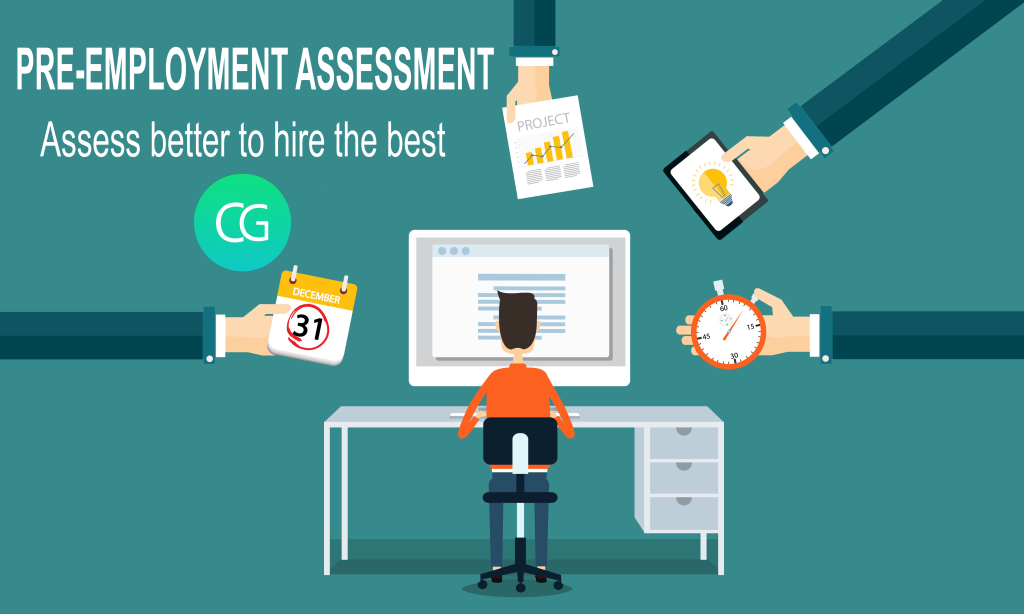
Are you looking for a job, facing pre-employment assessments, and feeling a bit perplexed? Well, you’re not alone! Job seekers across the USA often find these assessments a little confusing. But don’t worry; we’re here to help you decode the secrets to achieving success in 5 tips for Passing Pre-Employment Assessment.
Job hunting can feel a very difficult task. You go through listings, design your resume, and craft impeccable cover letters. Then comes the pre-employment assessment, a crucial stage. These evaluations are designed to scrutinize your skills, knowledge, and suitability for a role. However, fear not! With the right strategies, you can tackle these assessments with confidence. In this guide, we’ll explore, the test guide and provide you with five tips for passing these assessments with ease.

Table of Contents
What Are Pre-Employment Assessments?
Before to know the tips for acing these assessments, let’s understand what pre-employment assessments are. These are tools used by employers to evaluate a job candidate’s skills, abilities, and compatibility with the role they are applying for. Aptitude tests, personality tests, and skill evaluations are a few examples of these examinations. They guarantee that the selected applicant is the most qualified for the position and assist companies in making well-informed recruiting selections.
The Significance of Pre-Employment Assessments
Pre-employment assessments are not just another hurdle to clear. They are crucial for both employers and job seekers. For employers, assessments streamline the hiring process, reduce turnover, and improve the chances of selecting the right candidate. For job seekers, getting a job often depends on how well they do on these tests.
It’s crucial to remember that, even while assessments are useful tools, recruiting decisions should not be made only on the basis of them; rather, they should be made in conjunction with other evaluation techniques.
Also, ensuring that assessments are fair, relevant, and compliant with legal standards is crucial to their effectiveness and ethical use in the hiring process.
- Skill Evaluation: They help assess a candidate’s skills, knowledge, and expertise related to the job role. 1. This might include soft skills like problem-solving or communication as well as technical competencies.
- Cultural Fit: Evaluations can determine how well a candidate fits the values and culture of the organization. This is essential to guaranteeing their success and productive teamwork.
- Predicting Job Performance: A few tests try to estimate a candidate’s potential performance in a certain position. They can aid in making better recruiting decisions by offering perceptions into a candidate’s likelihood of success.
- Efficiency: Assessments can streamline the hiring process by filtering out candidates who don’t meet the required criteria. This saves time and resources by focusing on individuals who are more likely to be a good fit for the role.
- Reducing Bias: Standardized assessments can help reduce biases in the hiring process by providing a structured evaluation framework that focuses on job-related criteria rather than subjective opinions or first impressions.
- Development Opportunities: Assessments may also highlight areas where candidates could improve. Training and professional development plans can be informed by this information, which can be helpful to the employing organization as well as the individual.
Five Tips for Passing Pre-Employment Assessment
Understand the Assessment
Start by researching the type of assessment you’ll be taking. Is it a personality test, a skills-based evaluation, or a cognitive ability test? Understanding its structure, duration, and the skills or traits it aims to measure will help you tailor your preparation. For instance, if it’s a skills-based test, review the specific skills required for the job and practice scenarios or exercises related to those skills.

Practice and Preparation
Seek out sample assessments or practice tests online. While they may not replicate the exact questions, they’ll provide insight into the format, difficulty level, and types of questions you might encounter. Additionally, review relevant materials such as industry-specific knowledge, technical skills, or problem-solving techniques that might be assessed.
Remain composed and schedule your time.
Spend a time relaxing and concentrating before you begin. Pay attention to the amount of time allocated for each part or question during the evaluation. If you’re unsure about an answer, make a note to return to it later. Prioritize questions you’re more confident about to ensure you cover as much ground as possible within the given time frame.
Be Honest and Consistent
For assessments like personality tests or situational judgment tests, respond authentically. These assessments often have questions designed to detect inconsistencies in your answers. Stay true to yourself and your natural tendencies rather than trying to provide ‘ideal’ responses. Employers often value genuine and consistent personalities that align with the company culture.
Read Instructions Carefully
Take your time to read and understand each question and its instructions. Pay attention to any specific guidelines provided. Some assessments might have nuanced instructions or requirements for responding. Skipping over instructions hastily might lead to misunderstandings or errors, impacting your performance.
How Test banks can be a best test guide?
Test banks can serve as invaluable study tools when approached conscientiously. These resources offer comprehensive coverage of subject matter, spanning various topics and question types. Their diverse question formats multiple-choice, true/false, short answer provide students with an array of test scenarios, aiding in familiarization with different exam formats. By using test banks for regular practice, students can assess their strengths and weaknesses, refine their test-taking strategies, and manage time effectively during exams.
Moreover, these resources complement textbooks and lectures, offering additional examples and explanations that reinforce classroom learning. While utilizing test banks, students can identify key concepts, prioritize study efforts, and receive valuable feedback on their understanding.
However, it’s essential to use these resources ethically, avoiding over-reliance on memorization and instead focusing on a deep understanding of the material to maximize their effectiveness in exam preparation.
Testexambank| One- Stop shop
We can understand the appeal of wanting to find comprehensive resources like Test bank for studying purposes. However, I should highlight that purchasing or accessing test banks from certain sources, especially those not affiliated with your educational institution or recommended by your instructors, might raise ethical concerns or academic integrity issues.
There are various websites or platforms that claim to offer test banks, but it’s crucial to exercise caution. That’s we are recommending you to invest in test banks from Testexambank.
When seeking test banks for study purposes, it’s important to prioritize integrity and ethical practices in academic pursuits. While there are platforms or websites that claim to offer comprehensive test banks, purchasing or accessing these resources without endorsement from your educational institution or instructors may raise ethical concerns. Instead, consider official sources such as educational publishers who sometimes provide test banks along with textbooks for instructors or institutions.

Why choose Testexambank?
- Comprehensive Study Material: Testexambank may offer a wide array of study resources, including test banks, that cover various topics and question types. This breadth can be beneficial for students seeking comprehensive study materials.
- Diverse Question Formats: Platforms like Testexambank might provide different question formats, such as multiple-choice, true/false, and short answer, allowing students to practice and prepare for various types of assessments they might encounter.
- Supplement to Learning: These platforms can complement classroom learning by offering additional examples, explanations, and practice exercises beyond what’s covered in textbooks or lectures. This supplementation can aid in better understanding complex concepts.
- Self-Assessment and Practice: Testexambank may offer students the opportunity for self-assessment and practice. Regular practice using test banks can help students evaluate their knowledge, identify areas needing improvement, and refine test-taking strategies.
- Convenience and accessibility: Students can access study materials from any location with an internet connection with online platforms like Testexambank, providing flexible study schedules.
Test Exam Bank provides a lot of test guides related to numerous fields including:
| Title | Author | Type |
|---|---|---|
| Practical Guide to Inspection, Testing, and Certification of Electrical Installations 3rd Edition | Christopher Kitcher | Test Bank |
| Dental Hygienists Guide to Nutritional Care 4th Edition | Cynthia A. Stegeman | Test Bank |
| A Guide to Crisis Intervention 5th | Kanel | Test Bank |
| Pharmacology Clear And Simple A Guide to Drug 2nd Edition | Watkins | Test Bank |
| Astronomy A Beginners Guide To The Universe 7th Edition | Chaisson | Test Bank |
| Essentials of Testing and Assessment A Practical Guide for Counselors, Social Workers, and Psychologists, Enhanced 3rd Edition | Edward S. Neukrug | Test Bank |
| The Dental Hygienists Guide to Nutritional Care 4th Edition | Stegeman | Test Bank |
Conclusion
In the competitive job market of the USA, pre-employment assessments are common hurdles. However, with the right approach, you can conquer them. Understand the assessment type, practice diligently, manage your time effectively, stay calm, and learn from your experiences. And don’t forget to leverage the resources provided by Test Exam Bank for added support.
Remember, achieving pre-employment assessments is like taking an important exam. With the right preparation, you can achieve your desired outcome. So, gear up, take the assessments with confidence, and secure that dream job.
Frequently Asked Questions (FAQs)
What’s the purpose of a test guide for job seekers?
A test guide for job seekers is a resource that helps you prepare for pre-employment assessments, improving your chances of success.
Are there specific guides for different assessment types?
Yes, there are instructions designed specifically for different kinds of examinations, including situational judgment tests, personality tests, and cognitive tests.
How do I select the right test guide for my job application?
To choose the right guide, consider the assessment type, your budget, and guide quality. Test Exam Bank offers a range of recommended options.
Can a test guide guarantee assessment success?
While test guides enhance preparation, success also depends on your efforts and the specific assessment’s requirements.
Is Test Exam Bank suitable for job seekers outside the USA?
Test Exam Bank is accessible worldwide and can benefit job seekers from any location.






